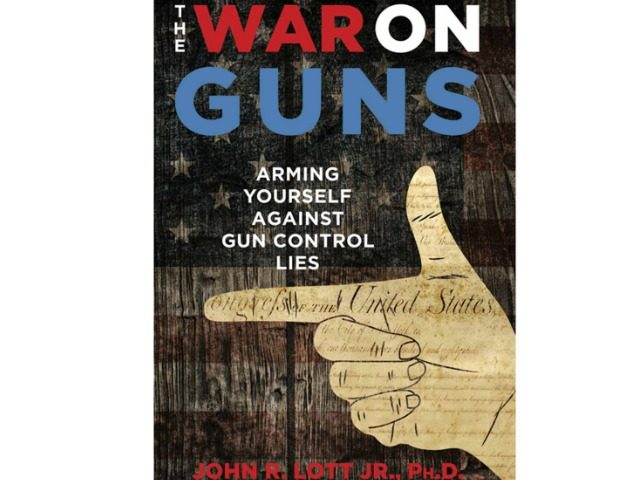If you have ever thought it would be helpful to have a reference book you could flip through to quickly read up on the actual facts surrounding things like background checks, mass public shootings, stand your ground laws, etc., then John Lott Jr.’s newest book The War on Guns: Arming Yourself Against Gun Control Lies is for you.
To be clear, The War on Guns is a rich and rewarding read from front to back when you first pick it up. Lott–an economist by training and founder of the Crime Prevention Research Center–does what he does best: he uses methods, statistics, reports, and studies to show that the left’s claims about guns and gun control are largely unfounded, if not completely untrue.
He did this same thing with his seminal work More Guns, Less Crime, by using FBI crime stats on a county-by-county basis to show that higher gun ownership correlated with lower rates of crime. To put it another way, Lott lets the stats speak for themselves, and this approach proves to be quite damning when brought to bear on the arguments the left perpetuates to support gun control.
In The War on Guns Lott gives the reader a thorough overview of almost every conceivable area in which the battle over gun rights will play out in the coming 12 to 18 months. This includes showing how gun controllers–like those groups funded by Michael Bloomberg–fudge polls to skew public perception on guns and gun laws. It also includes showing how the mainstream media and other outlets favorable to gun control fall in line to push a narrative on mass public shootings that actually leaves the facts that are most pertinent to the shooting itself.
A prime example of this is the April 16, 2007, Virginia Tech shooting. That shooting is often cited by gun control advocates as proof of a need to expand background checks and the information examined during a background check. Gun controllers argue that the attacker–Seung-Hui Cho–had been found mentally incompetent but was able to pass a background check because the system is flawed and/or needs to be expanded. Lott blows such claims away, writing:
Seung-Hui Cho, the Virginia Tech killer, was subject to a commitment hearing. However, licensed psychologist Roy Crouse performed an independent evaluation and found Cho to be “mentally ill” but concluded, “he does not present an imminent danger to (himself/others) … he does not require involuntary hospitalization.
Another psychiatrist arrived at a similar determination on Cho, and the judge in Cho’s case ruled against “involuntary [commitment].” The lesson–even if background checks were expanded to a universal format, they would not have stopped Cho because the threshold for denying a gun purchase regarding mental health is involuntary commitment, and he was not ordered to be committed in this fashion.
With the Virginia Tech killer and myriad other examples, Lott shatters the left’s promises that an expansion of background checks would make us safe. In fact, he goes from topic to topic–stand your ground, gun licensing, gun registration, gun free zones, etc.–similarly exposing and then defeating the left’s claims in each instance.
His work on gun-free zones is very powerful. He shows that 92% of mass public shootings which occurred between 2009 and 2015 took place in gun-free zones. Only eight percent occurred where guns were allowable on some level. Moreover, from 1950 to 2010, “Not a single public mass shooting occurred in an area where general civilians are allowed to carry guns.”
Lott writes: “The infamous 2015 Charleston, South Carolina, church shooting was originally going to be a college shooting. But Dylan Roof changed plans after realizing the College of Charleston had armed guards.” Wouldn’t that have been a pertinent piece of information for CNN, MSBNC, the Democrat Party, or gun control’s other willing accomplices to provide? But they could not provide it because it completely undercuts their template, which is that guns, in general, are bad, and some guns–AR-15s and semiautomatic handguns, in particular–are worse.
Lott provides another example:
The Batman movie theater killer, James Holmes, initially considered attacking an airport. In his diary, which was released in 2015, he explained his decision against targeting an airport because of “substantial security.” He then selected the only theater within twenty minutes of his apartment that banned permitted concealed handguns. There were six other theaters he could have gone to. The one he picked wasn’t even the one with the largest auditorium or that one that was closest to his home.
But it was the one where law-abiding citizens were mandated to be unarmed.
And so it goes, with fact after fact after fact Lott exposes then destroys the left’s contention that gun-free zones are not magnets for killers. And then he moves on to the next topic and does the same thing.
The War on Guns will educate you and will then become a reference resource you will turn to again and again when you hear a Hollywood celebrity or a media talking head tell you more background checks equal more safety, or stand your ground laws endanger blacks, or that “public health research” is key to lowering gun crime. Reading the book really does translate into “arming yourself against gun control lies.”
AWR Hawkins is the Second Amendment columnist for Breitbart News and host of “Bullets with AWR Hawkins,” a Breitbart News podcast. He is also the political analyst for Armed American Radio. Follow him on Twitter: @AWRHawkins. Reach him directly at awrhawkins@breitbart.com.

COMMENTS
Please let us know if you're having issues with commenting.